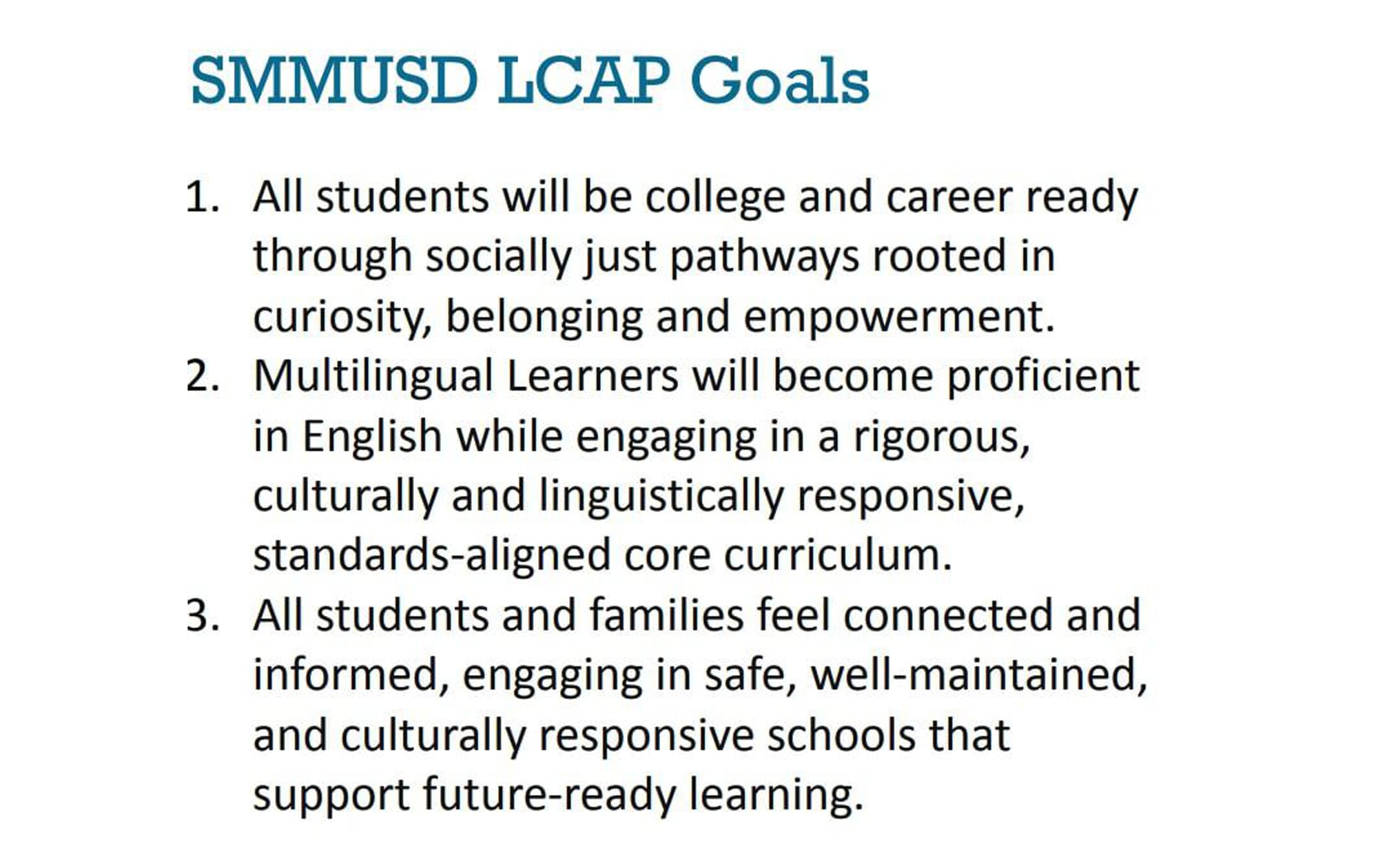The Santa Monica-Malibu Unified School District (SMMUSD) Board of Education is taking the opportunity to retool its Local Control and Accountability Plan (LCAP), formulating amended goals for the three-year cycle beginning in the 2024-25 school year.
At the June 25 board meeting, the board adopted the 2024-25 LCAP, which was presented by SMMUSD Assistant Superintendent of Educational Services Dr. Stacy Williamson at the June 6 board meeting, followed by a brief public hearing at the June 20 meeting. Williamson noted that after 11 different meetings with stakeholder groups to gain feedback, the new LCAP is ready for the public, specially focused on socially disadvantaged students, foster youth and English language learners.
Under the mission statement of "extraordinary achievement for all students while simultaneously closing the achievement gap," the three main LCAP goals remain similar in nature, albeit with some language changes. The first goal, noted in 2023-24 as "students will graduate prepared for college, career and life," now reads that "all students will be college and career ready through socially just pathways rooted in curiosity, belonging and empowerment."
The first action item under this goal centers on fiscal services, namely the development of the district’s annual fiscal plan "consistent with the implementation of the district’s vision and goals." Boardmember Jon Kean complemented the LCAP beginning with this item, showcasing the importance of finances in all LCAP priorities.
"If we don’t take care of our budget, we do none of this … we can write whatever we want to write, but if we don’t have the budget to do it, we achieve nothing," Kean said.
Another major action item within the first LCAP goal is the recruitment and selection of "diverse highly qualified staff," including the commitment by district Human Resources to "explore partnerships with local colleges and universities to establish pipelines into the teaching and administrative professions."
Boardmember Maria Leon-Vasquez stated that these partnerships are crucial in hard to recruit areas like Special Education, and represent a chance to establish a more diverse district workforce.
"[Students] that are moving forward [with their] Ed.D. studies and doctoral studies, [we] can maybe tap in with them to see if they might have [opportunities with] the particular universities they’re at," Leon-Vasquez said.
Human Resources staff will also be exploring the development of a Behaviorist Intern position for recruiting and maintaining special education paraeducators, something Leon-Vasquez said is a "really key" position to explore, giving the district a crack at Master’s Degree college candidates.
For those that are hired, the LCAP proposes a "robust, equity-focused" New Teacher Induction Program for staff development, which will cultivate "reflective practices through mentorship, professional learning and inquiry." To that action item, Leon-Vasquez proposed that new staff members be taken on a tour of the city, specifically the Pico neighborhood, in order to show "what [the] community looks like."

The second LCAP goal is similar to this past year’s, focusing on linguistics but altering the phrase "English learners" to "Multilingual learners" that "will become proficient in English while engaging in a rigorous, culturally and linguistically responsive, standards-aligned core curriculum." This goal includes English Language Development (ELD) actions such as teachers embedding Integrated ELD into instructional content, while also providing supplemental ELD support across grade levels.
Rounding out the goals is an update to this past year’s objective to "cultivate a safe, secure & positive school culture," which now reads "all students and families feel connected and informed, engaging in safe, well-maintained and culturally responsive schools that support future-ready learning."
Two core focuses of this goal are nipping absenteeism and supporting mental well-being. The LCAP report notes that African-American and Homeless students are "in the red" as far as chronic absenteeism, and to address this, school site Senior Office Specialists and administration will conduct "empathy interviews" to gather information about reasons for absences "in a culturally responsive and caring manner in order to provide targeted support tailored to each student’s needs."
Absences due to suspensions will also look to be reduced through "a proactive, preventative" Multi-Tiered Systems of Support framework and Positive Behavior Intervention Support Plan; both aimed at considering and implementing "other means of correction when appropriate" so that students "may remain engaged in their school" and "participate in a safe, healthy, welcoming and affirming school community."
A mental health and wellness priority starts with staff, as all sites will receive training in depression and suicide awareness to recognize signs and support students. Mental health themed workshops and training will also be provided to students and parents as part of this action item. Further student support will come in the form of development and maintaining of wellness spaces at all school sites, as well as the utilization of a social emotional learning curriculum "to support social emotional health and develop positive coping skills."
After the June 20 public hearing, which included a public comment from Santa Monica Parents for Slow Tech stressing a phone-free policy for the district, the board approved the LCAP at the June 25 meeting, along with adopting the 2024-25 district budget.

